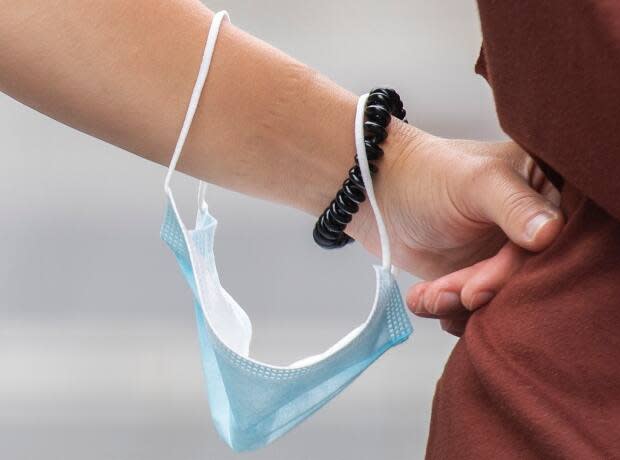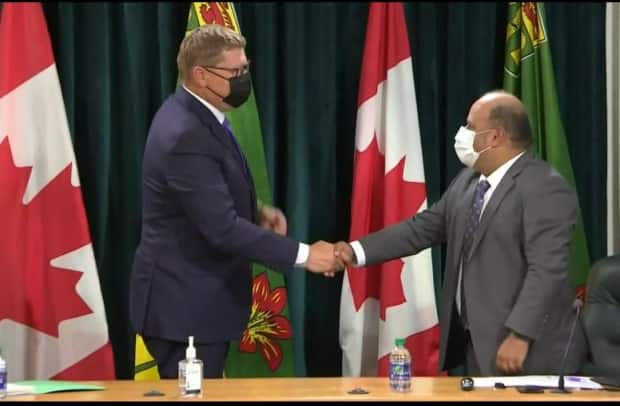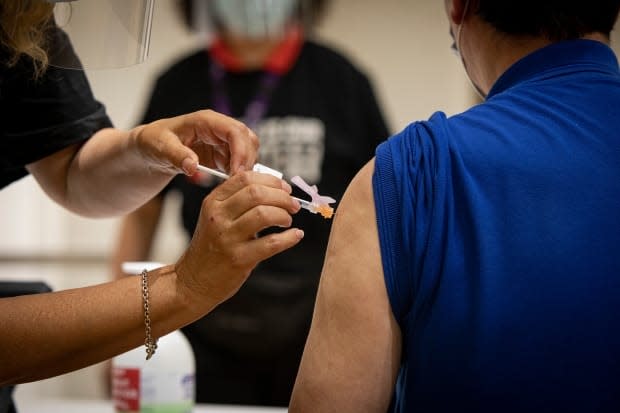Alberta, Saskatchewan removing public health restrictions 'a bad mistake' right now, experts say

Getting rid of provincial COVID-19 restrictions and protocols is a mistake right now, public health experts say.
Saskatchewan was the first Canadian province to lift all public health restrictions last month, while Alberta plans to phase them out by mid-August.
But neither province has reached herd immunity, and the move sends the message that the pandemic is over — despite children not being immunized and data showing the delta variant is spreading among vaccinated people in other jurisdictions, experts say.
"This is a bad mistake at this time," said Dr. Ali Mokdad, professor and chief strategy officer of population health at the University of Washington.
Saskatchewan lifted all public health rules on July 11. Premier Scott Moe went all in on vaccines, saying his government doesn't want to control the spread of the novel coronavirus through government regulation.
Saskatchewan's health minister has since tested positive for COVID-19, but he backed the move and urged residents to hold themselves accountable when it comes to self-isolating.

Alberta, meanwhile, lifted most of its public health restrictions on July 1. Since then, COVID-19 cases have increased and the R-value — rate of people infected per infected person — has eclipsed the peak of the third wave.
Last week, Alberta's chief medical officer of health Dr. Deena Hinshaw announced the province plans to phase out COVID-19 rules by Aug. 16 in order to prepare the health-care response for the flu and other communicable diseases in the fall.
The transition started Thursday. Quarantine is now recommended instead of mandatory for close contacts of a positive case, and people who test positive are now the ones who have to notify close contacts — not contact tracers.
Quarantine may be required in some high-risk settings or for outbreak management. Contact tracers and outbreak management will focus on high-risk settings, while community outbreaks will be addressed as needed.
Testing asymptomatic close contacts is no longer recommended. Mask mandates for acute- and continuing-care facilities — as well as public transit, taxis and ride-share vehicles — are still in effect.
Saskatchewan and Alberta are the only places in North America taking these actions right now, said Mokdad.

Decision-makers looking at fully reopening ought to consider how to improve ventilation in buildings, as the novel coronavirus is transmitted through the air, said Mario Possamai, a SARS researcher who worked on several reports and investigations related to COVID-19.
Precautions implemented to prevent airborne transmission have been effective in controlling the spread of the virus, and those efforts should focus on high-risk settings and ensuring people working there have proper respirators, he said.
"If you do that, you have a better opportunity to safely reopen," Possamai said, adding that the cost of improving ventilation is cheaper than a lockdown.
Herd immunity not yet reached: experts
Dr. Nazeem Muhajarine was surprised to hear Hinshaw's announcement last week.
"It is premature," said Muhajarine, professor of community health and epidemiology at the University of Saskatchewan.
"We haven't reached that level of collective immunity that we want to see before we can be thinking about an endemic situation."
Upward of 80 per cent of the population has to be immune from COVID-19, either through infection or vaccination, before herd immunity occurs, according to Mokdad and Muhajarine.
COVID-19 vaccines have only been approved for people aged 12 and up in Canada, so most children cannot be protected yet.
As of July 30, about 65 per cent of eligible Albertans have received both doses of a COVID-19 vaccine. Only 63 per cent of eligible people in Saskatchewan have received both doses.
About five per cent of Alberta's population — including children — have contracted COVID-19, while just over four per cent of Saskatchewan's population has tested positive for the illness, according to provincial data.
Neither province is near the herd-immunity threshold.
At some point, society will have to learn to live with COVID-19. But evidence suggests now is not the time for policy changes seen in Saskatchewan and that are planned to occur in Alberta, said Muhajarine.

Part of the concern is that variant strains of the novel coronavirus — namely the delta variant — are more transmissible, and vaccinated people are contracting those strains of the virus in places such as the United States and United Kingdom, said Mokdad.
The Centers for Disease Control and Prevention in the U.S., for example, has changed its messaging for vaccinated people as a result. Fully-vaccinated people in COVID-19 hotspots are now advised to wear masks when inside public places, as they could spread the novel coronavirus.
"We need to be very careful," said Mokdad.
Vaccinated people who do test positive for COVID-19 are rarely admitted to hospital or die.
Reopening could lead to 4th wave, projections suggest
The Institute for Health Metrics and Evaluation (IHME), an independent population health research centre at the University of Washington, offers COVID-19 projections for countries around the world based on available data and factoring in public health measures.
COVID-19 cases in Saskatchewan are rising again, and 578 residents have died from the illness to date, provincial data shows.
But the province's complete reopening could lead to a fourth wave and the number of deaths could increase to about 657 to 690 by the end of October, IHME projections suggest.
If Alberta lifts restrictions as planned, projections suggest the province will be in a fourth wave in September, and deaths could spike to about 2,504 to 2,753 by the end of October.
There have been 2,328 Albertans who have died from COVID-19 as of July 29.

 Yahoo Movies
Yahoo Movies 